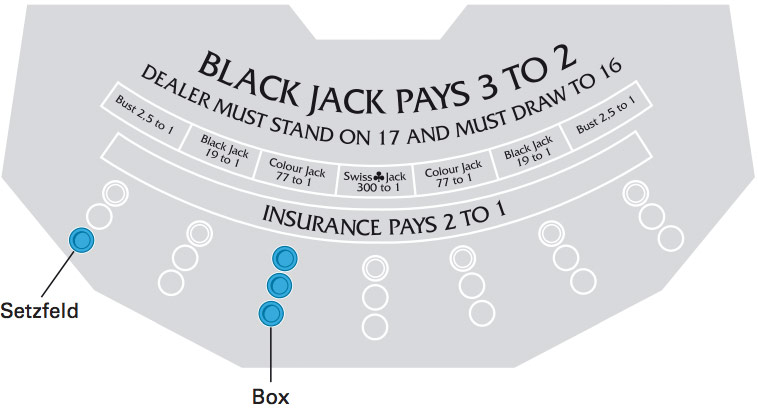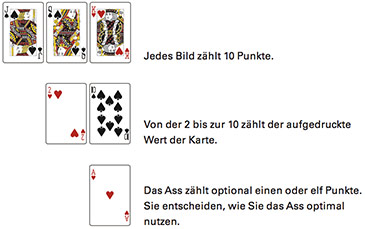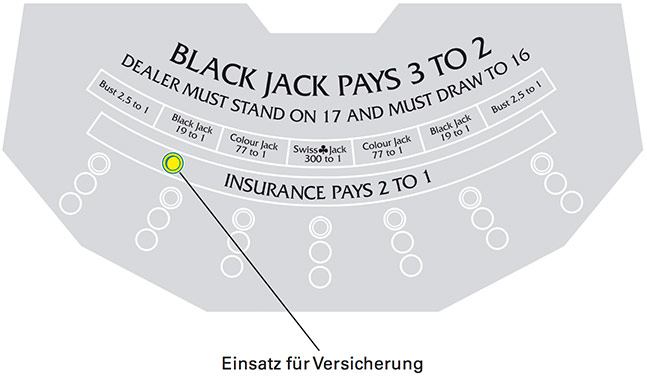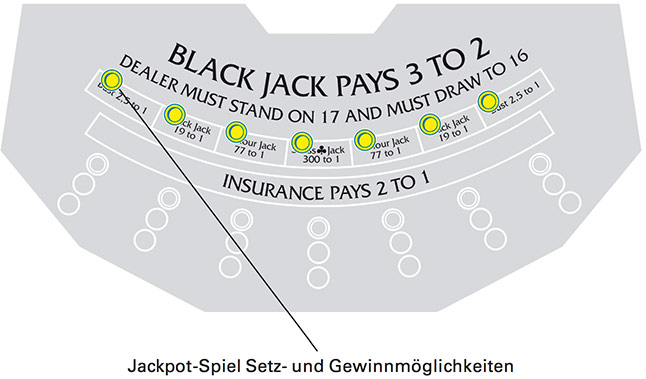
Black Jack is one of the most popular card games in the casino world.
Simple & varied
Originally derived from the popular French “Vingt-et-un”, it was developed into today’s Black Jack around 1850 in the USA. The game is also associated with “17+4” or “21”. Its features are a simple set of rules and a varied gameplay.
The game
Originally derived from the popular French “Vingt-et-un”, it was developed into today’s Black Jack around 1850 in the USA. The characteristics of Black Jack, which is also called “17 + 4” or “21”, are a simple set of rules and the varied gameplay.
The goal
In Black Jack the aim is to reach the point value of 21 with your own cards or to get as close to this size as possible. Under no circumstances may the value of 21 points be exceeded. All players bet against the bank, which is represented by the croupier, known in Black Jack as the dealer.
The tableau
The Black Jack playing field is called the tableau. This is divided into circular seating fields, with three of these circles forming a box. The guest sitting in front of the corresponding box is the box owner, who places his bet in a double circle. Each box on which a bet has been placed takes part in the next game. You can play in one or more boxes. After all bets have been made on the betting fields, the dealer calls off the game. Then begins
he with the card issue. The minimum and maximum bet per box is stated at the gaming table.

The playing cards and their values
Black Jack is played with a hand of 52. This consists of 13 card values in the four playing suits of diamonds, hearts, spades and clubs. The game suit is not relevant to the card values. Six decks of 52 cards are used.

The gameplay
Each box participating in the game initially receives two cards. The dealer then draws a card and places it in front of him. All cards are dealt face up and are visible to all players. As the box owner, you have to decide how many additional cards the dealer will draw for you – other than the first two. To do this, he queries each box. “Card” is your announcement for another card, “Rest” is the announcement for the dealer not to deal any more cards for your box. If you get a total of over 21 points, called a bust, you have busted and the bet on the box in question will be immediately withdrawn by the dealer. Only after all boxes have been queried does the dealer give himself a second card in addition to his first. Whether he draws further cards for himself depends on the following rule: The dealer draws cards for the bank until a minimum value of 17 is reached. If the value of 21 is exceeded, the bank has overbought and all players win.
The profit
If you score more points with your box than the dealer, your bet will be doubled. If you have the same number of points as the dealer, the game ends in a draw for your box, or stand-off in technical jargon. Your stake then remains unchanged. If you score 21 points with the first two cards (e.g. a king and ace or an ace and a ten), this is called a “blackjack”. In this case, a profit is paid out in a ratio of 3:2 (e.g. for a stake of CHF 20 you will receive an additional CHF 30).
The special rules
In addition to the simple basic rules, there are some additional variants:
Split (split)
If the first two cards in a box are of equal value (e.g. two aces or two nines), the box owner can split his box so that a new hand is formed from one of the two cards of equal value.
The two cards are separated by the dealer and now form their own hand. The box holder now places an equivalent bet as before on the new hand. Afterwards, the other players in a box can also bet on the new hand under the same conditions. Do not bet on the new hand, only play in the original hand.

After splitting, the dealer deals the cards for both the original and the new hand. The box owner determines the number of cards to be given up. The important thing here is that at least one more card must be drawn, a total of two cards. Only when splitting two aces does each hand receive exactly one, i.e. a total of two cards each. In this case, if a hand reaches 21 points with two cards, this is not Black Jack, but counts as 21.
Double
At Casino Davos, any card value consisting of two cards can be doubled. However, it is advisable to do this with card values 9, 10 and 11….
If the number is doubled, only one card will be issued to the box in question.

Insurance
If the bank draws an ace as the first card, you can insure yourself against a possible blackjack from the bank, regardless of your first two cards. Before the dealer asks the individual box holders for additional cards, the insurance bets are placed.

You can place half of your stake on the InsuranceLine. The dealer then moves on to the rest of the game and finally draws his own cards. If he deals a ten-value card as his second card, he has a “Black Jack”. This means that bets on the insurance line win. They are paid out at a ratio of 2:1 (e.g. for a stake of CHF 20 you will receive an additional CHF 40). If the bank doesn’t pull Black Jack, all insurance companies lose.
Additional opportunities
We at Casino Davos offer our guests further additional opportunities. These can be played independently of normal Black Jack. With our additional chances, however, you always bet on the bank and not on yourself. These additional chances are located in a semicircle between the insurance line and the bank.

You can bet chips on the card value that the bank will achieve. The assessment of whether your stake in the jackpot game Swiss Jack will win is therefore independent of your own cards.
| Bust = The dealer busts. Payout: 2.5 times |
|
| Black Jack = The dealer draws any “Black Jack” for yourself. Payout: 19 fold |
e.g.  |
| Colour Jack = The dealer draws a “Black Jack” for yourself in a playing suit (e.g. spades). Payout: 77 fold |
e.g.  |
| Swiss Jack = The dealer draws for himself a “Black Jack” with two club cards. Payout: 300 fold |
e.g.  |

Slots
A colorful mix of slot machines with every game variation imaginable.








